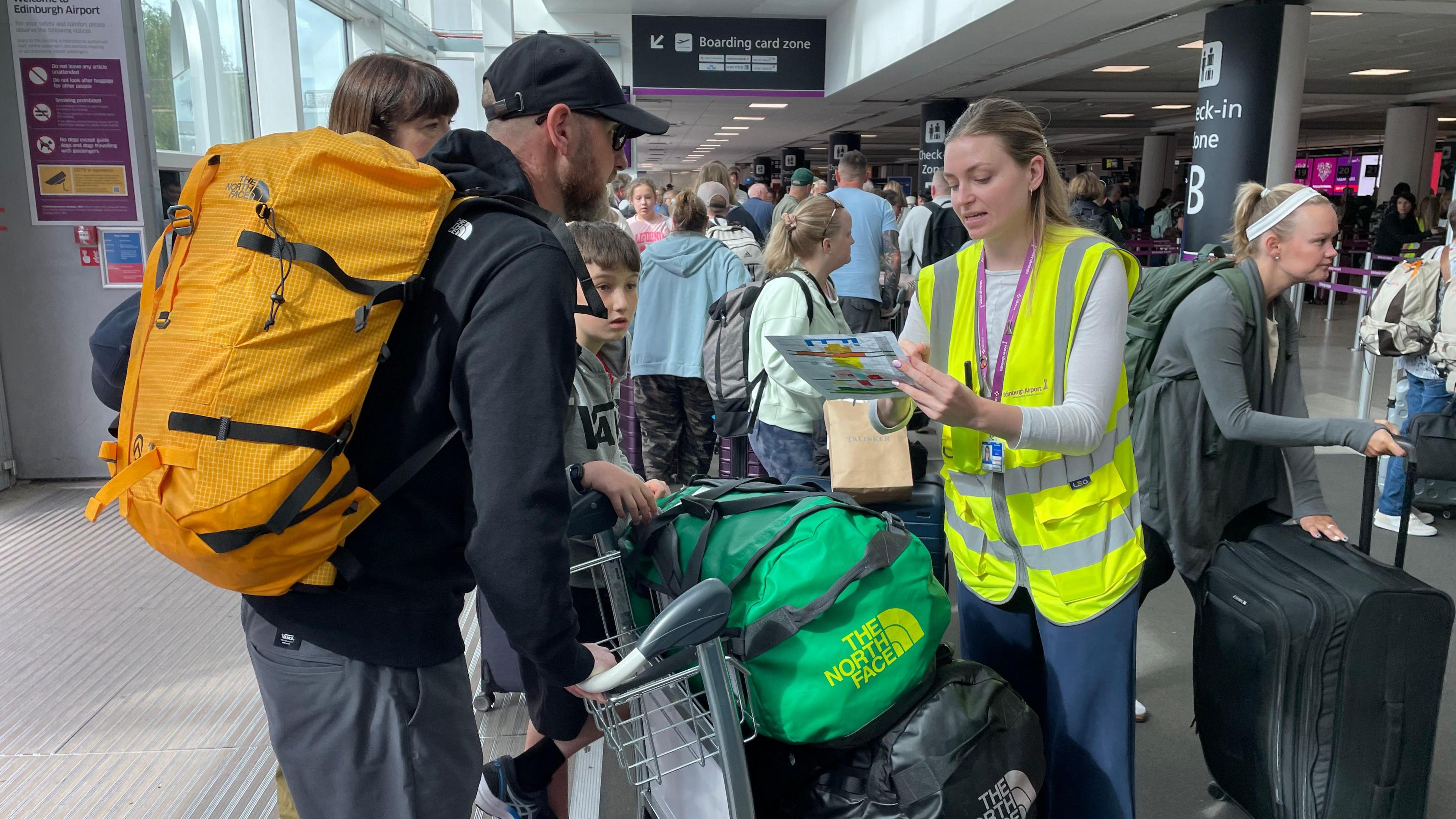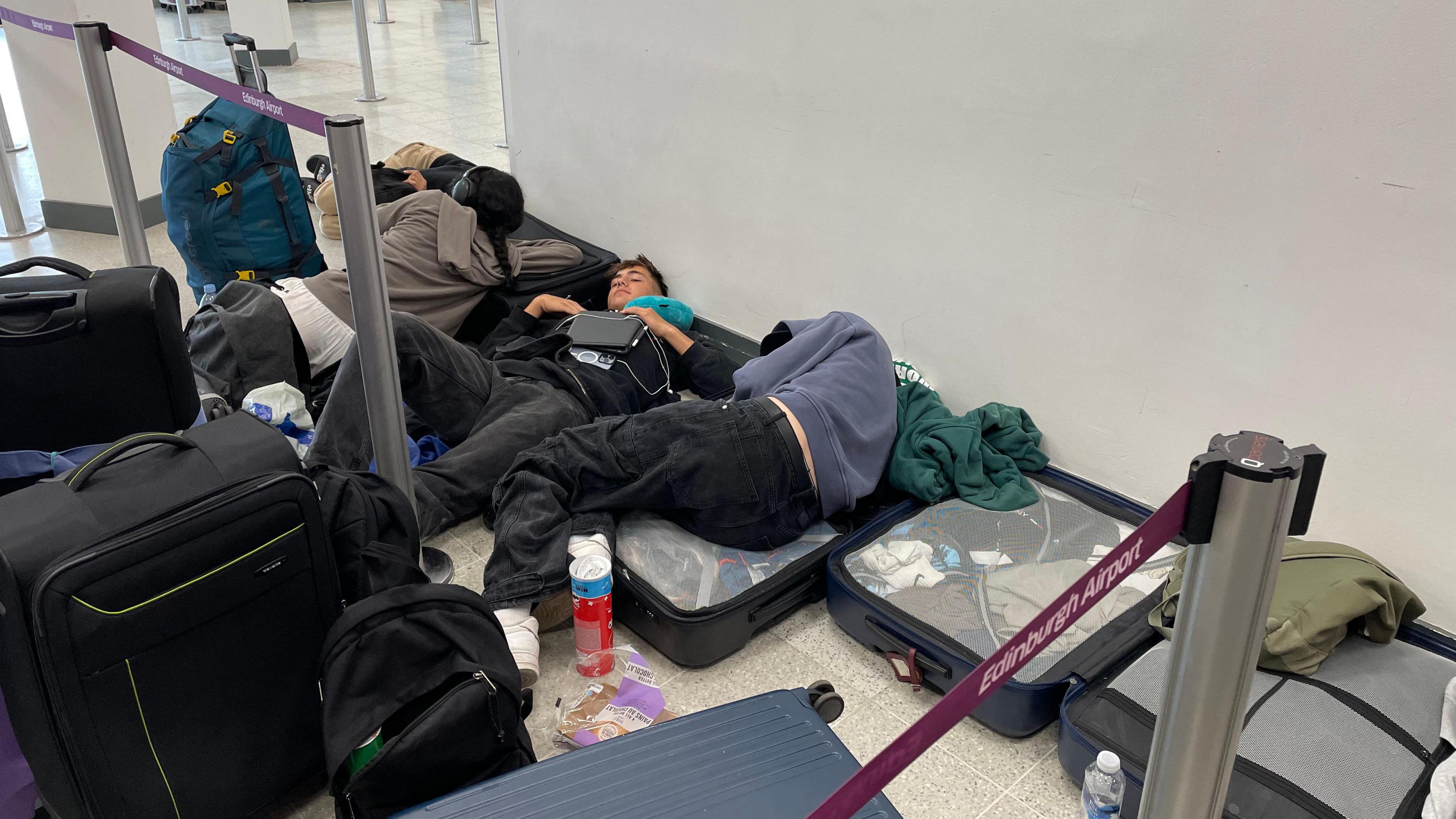Edinburgh Airport 'returning to normal' after global IT outage

Extra staff have been deployed to help those who had their journeys rescheduled
- Published
Passengers planning to travel from Edinburgh Airport over the weekend have been urged to check their flights before setting off following the worldwide IT outage.
A spokesman said services were "returning to normal" after it was hit by a global “defect” in a Microsoft Windows update by cybersecurity firm CrowdStrike.
Banks, media, online payment providers and NHS services were also badly affected by the shutdown.
More than 50 flights in and out of Edinburgh were cancelled on Friday as a result but most have taken off and landed as planned on Saturday.

Some passengers slept on the floor overnight while they awaited their flights
Some passengers who had been unable to travel slept on the airport’s floors overnight but the majority have now continued on to their destination.
Departure boards have also been restored after being frozen shortly after 07:00 on Friday.
It caused scenes of chaos with huge queues spilling out of the terminal.
A fire alarm also sounded, which was understood to be connected to the IT issues, and travellers were advised to avoid making their journeys.
Staff have been deployed to assist those rebooked on flights over the weekend.
An airport spokesman said: "Things are now returning to normal at Edinburgh Airport but clearly there will be knock-on impacts across the aviation network.
"Passengers should continue to check with their airline for flight updates over the coming days.
"We would like to thank passengers for their understanding."

Patricia Battain, from Paris, and her family slept on the floor of the terminal overnight
Patricia Battain, from Paris, was among hundreds of passengers affected by grounded flights on Friday.
She and her family - including children aged two and seven - had been moments from boarding an alternative flight to the French capital at 23:30 before that too was cancelled.
Ms Battain was unable to find any vacant hotel rooms nearby, forcing the family to spend the night in the terminal.
They have now been booked on another flight, but that does not leave until early on Sunday.
She told BBC Scotland News: "Everyone was a little bit hectic because they wanted to find a flight or a hotel room for the night.
"Some people were doing complicated routes, they were going from Edinburgh to Ibiza, then to Marseille, then to Paris, but that was too much for us.
"We found a place at the airport, but a few hours later, someone told us we could not stay there because the area was closing, so we had to wake up the children and move to another part of the airport.
"I think we had four different places before we were allowed to stay."

Alan Finlayson said he had been left in a similar situation before
Alan Finlayson arrived at the airport on Saturday morning to offer accommodation to those who needed it.
Mr Finlayson said he had been approached by one group but had to turn them down as he did not have enough room.
He added: "I've been in this situation myself.
"I feel sorry for those poor people who haven't been able to catch their flights, so I thought I would come along and offer to help."
Glasgow and Aberdeen airports said they had been largely unaffected.
However, multiple other airports in the UK and across the world reported delays, with many flights suspended.
As of Friday evening, 338 flights in and out of the UK - 167 departures and 171 arrivals - had been cancelled, according to aviation analytics firm Cirium.
More than 5,000 flights were cancelled across the world – 4.6% of those scheduled.
Meanwhile, NHS Shetland experienced issues with its fire alarm system, while NHS Grampian and NHS Borders both suffered disruption.
Several football clubs, including Premiership sides Heart of Midlothian and Hibernian, said they were unable to process ticket sales.
Both have since been restored to normal, the clubs later confirmed on X.
CrowdStrike CEO George Kurtz confirmed the issue had not been cause by a cybersecurity incident and apologised for "inconvenience and disruption".
"We understand the gravity of the situation and are deeply sorry for the inconvenience and disruption," he wrote on social media.
"As noted earlier, the issue has been identified and a fix has been deployed."